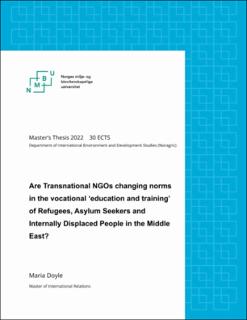| dc.description.abstract | In the field of International Relations (hereafter referred to as IR), the role of Transnational Non Governmental Organisations (hereafter TNGOs) has changed; as the field of IR has traditionally been dominated by state-centric approaches, the role of NGOs was once considered insignificant, but is now considered to play an important role because of their ability to contribute to changing international norms, principles and agendas in local contexts (Joachim, 2020, pp. 349-50). TNGOs and International Organisations have developed various multi-agency, multi-sectoral frameworks, policies and programmes, all aimed at enabling refugees, asylum seekers, and internally displaced people (hereafter RASIDPs) to access quality education and training regardless of gender, age, race or asylum status. Several international frameworks now recommend including Youth in creating sustainable, durable solutions for their futures (IASC 2020, INEE 2021, UNGA 2015, UNHCR 2017, 2019, 2020) so their voices are imperative in the creation of policies and strategies involving their education, training and future livelihoods.
Having said this, these policies and strategies are not necessarily accepted or implemented across all education and training institutions in the countries where TNGOs are operating; therefore local education and training norms may or may not be affected. Given the role of TNGOs in humanitarian settings, how much power does an organisation like the NRC have in terms of changing norms within those countries and institutions? Are local beliefs changeable by international influence and if so, how much? Can TNGOs like the NRC shape the way a nationality or nation of foreign residents thinks about what is needed for Youth RASIDPs need for success, and what best practice education and training looks like?
Based on data gathered from a survey administered across several NRC vocational education and training centres in Iraq, Jordan, Lebanon and Syria, this paper is a norms based exploration into the role of TNGOs as providers of normative change in a case study of RASIDPs engaged in TVET (Technical and Vocational Education and Training) in the Middle East. The survey was administered to 171 youth learners (aged 15 plus) and 65 trainers of six Arabic speaking nationalities, and the data shows which norms are changing and which norms have not yet been affected, when compared with traditional approaches to TVET in the Middle East. This data also contributes to the lack of academic data that exists on perceived needs of learners in education in emergency contexts. | en_US |

